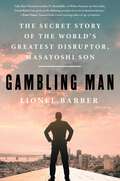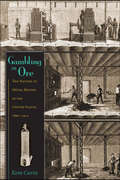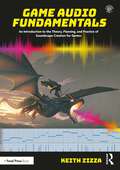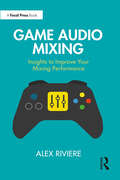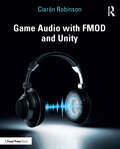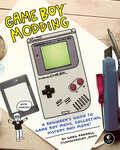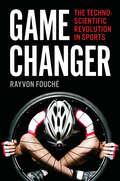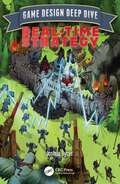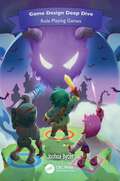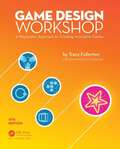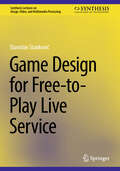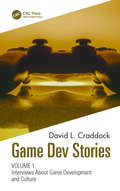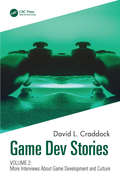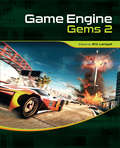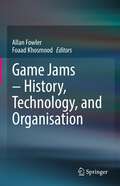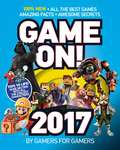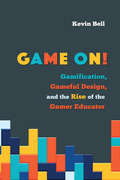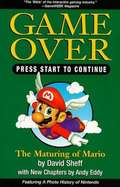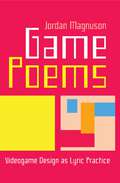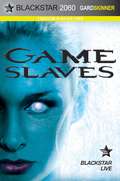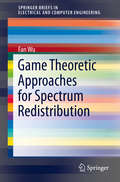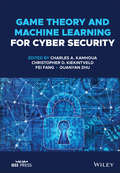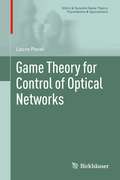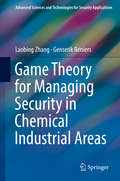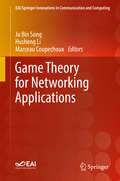- Table View
- List View
Gambling Man: The Secret Story of the World's Greatest Disruptor, Masayoshi Son
by Lionel Barber&“The defining account of an era in business history.&” —Evan Osnos, National Book Award–winning author of Age of Ambition The unputdownable first Western biography of SoftBank CEO Masayoshi Son, financial disruptor and personification of the 21st century&’s addiction to instant wealth, from the former editor of the Financial Times. As Wall Street swooned and boomed through the last decade, our livelihoods have—now more than ever—come to rely upon the good sense and risk appetites of a few standout investors. And amidst the BlackRocks, Vanguards, and Berkshire Hathaways stands arguably the most iconoclastic of them all: SoftBank&’s Masayoshi Son. In Gambling Man, the first Western biography of Son, the self-professed unicorn hunter, we go behind the scenes of the world&’s most monied halls of power in New York, Tokyo, Silicon Valley, Saudi Arabia, and beyond to see how Son&’s firm SoftBank has defied conventional wisdom and imposing odds to push global tech and commerce into the future. From the dizzying highs of Uber, DoorDash, and Slack to the epic lows of WeWork and tech-infused dogwalking app Wag Son and SoftBank have been at the center of cutting-edge capitalism&’s absolute peaks and valleys. In the process, Son, son of a pachinko kingpin who grew up in a slum in Japan, has been a hero, a villain, and even a meme-ified hero to the internet tech- and finance-bro set all at once. Based on in-depth research and eye-opening interviews, Gambling Man is an unforgettable character study and alarming true story of twenty-first-century commerce that will stick with you long after you turn the final page.
Gambling on Ore: The Nature of Metal Mining in the United States, 1860–1910 (Mining the American West)
by Kent CurtisGambling on Ore examines the development of the western mining industry from the tumultuous and violent Gold Rush to the elevation of large-scale copper mining in the early twentieth century, using Montana as representative of mining developments in the broader US mining west. Employing abundant new historical evidence in key primary and secondary sources, Curtis tells the story of the inescapable relationship of mining to nature in the modern world as the United States moved from a primarily agricultural society to a mining nation in the second half of the nineteenth century. In Montana, legal issues and politics—such as unexpected consequences of federal mining law and the electrification of the United States—further complicated the mining industry’s already complex relationship to geology, while government policy, legal frameworks, dominant understandings of nature, and the exigencies of profit and production drove the industry in momentous and surprising directions. Despite its many uncertainties, mining became an important part of American culture and daily life. Gambling on Ore unpacks the tangled relationships between mining and the natural world that gave material possibility to the age of electricity. Metal mining has had a profound influence on the human ecology and the social relationships of North America through the twentieth century and throughout the world after World War II. Understanding how we forged these relationships is central to understanding the environmental history of the United States after 1850.
Game Audio Fundamentals: An Introduction to the Theory, Planning, and Practice of Soundscape Creation for Games
by Keith ZizzaGame Audio Fundamentals takes the reader on a journey through game audio design: from analog and digital audio basics to the art and execution of sound effects, soundtracks, and voice production, as well as learning how to make sense of a truly effective soundscape. Presuming no pre-existing knowledge, this accessible guide is accompanied by online resources – including practical examples and incremental DAW exercises – and presents the theory and practice of game audio in detail, and in a format anyone can understand. This is essential reading for any aspiring game audio designer, as well as students and professionals from a range of backgrounds, including music, audio engineering, and game design.
Game Audio Mixing: Insights to Improve Your Mixing Performance
by Alex RiviereGame Audio Mixing offers a holistic view of the mixing process for games, from philosophical and psychological considerations to the artistic considerations and technical processes behind acoustic rendering, interactive mixing, mastering, and much more. This book includes a comprehensive overview of many game audio mixing techniques, processes, and workflows, with advice from audio directors and sound supervisors. Through a series of accessible insights and interviews, the reader is guided through cutting-edge tips and tricks to equip them to improve their own mixing practice. As well as covering how to plan and create a mix that is clear, focused, and highly interactive, this book provides information about typical mixing tools and techniques, such as dealing with bus structure, frequency spectrum, effects, dynamic, volume, 2D and 3D spaces, and automations. Key information about how to deal with a large number of sounds and their prioritization in the mix is also included, from high-level mixing visions to in-depth designs with sound categorizations at the core. Game Audio Mixing is essential reading for all game audio professionals, including those new to the industry, as well as experienced professionals working on AAA and indie titles, in addition to aspiring professionals and hobbyists.
Game Audio with FMOD and Unity
by Ciarán RobinsonGame Audio with FMOD and Unity introduces readers to the principles and practice of game audio through the process of creating their own First Person Shooter (FPS) game. All the basics are covered, as well as a simple introduction to coding. Using the free software Unity and FMOD Audio Middleware, the reader will be able to create a game of their own and develop a portfolio that demonstrates their capacities in interactive sound design. Perfect for classroom use or independent study, Game Audio with FMOD and Unity also comes with a full suite of audio assets provided on a companion website.
Game Boy Modding: A Beginner's Guide to Game Boy Mods, Collecting, History, and More!
by Greg FarrellComplete beginner's guide to all aspects of modifying the classic Nintendo Game Boy.Game Boy Modding teaches you how to purchase, refurbish, mod, and customize Nintendo handheld consoles. The consoles are widely available and the customizations are affordable, requiring only limited tools and know-how. Retro consoles are seeing a resurgence of popularity worldwide, and king among these throwback devices is the Nintendo Game Boy, which sold over 100 million units in its lifetime and introduced gamers to Mario and Pokemon. These consoles emanate pixelated 8-bit retro charm, but lack the modern technological enhancements that we take for granted in 2020. You'll learn basic soldering and hardware modification techniques; how to change speakers, buttons, and screen lenses; how to fix dead speakers and sticky buttons; and how to personalize your Game Boy to your heart's content.
Game Changer: The Technoscientific Revolution in Sports
by Rayvon FouchéHow has technology challenged the notion of unadulterated athletic performance?We like to think of sports as elemental: strong bodies trained to overcome height, weight, distance; the thrill of earned victory or the agony of defeat in a contest decided on a level playing field. But in Game Changer, Rayvon Fouché argues that sports have been radically shaped by an explosion of scientific and technological advances in materials, training, nutrition, and medicine dedicated to making athletes stronger and faster. Technoscience, as Fouché dubs it, increasingly gives the edge (however slight) to the athlete with the latest gear, the most advanced training equipment, or the performance-enhancing drugs that are hardest to detect. In this revealing book, Fouché examines a variety of sports paraphernalia and enhancements, from fast suits, athletic shoes, and racing bicycles to basketballs and prosthetic limbs. He also takes a hard look at gender verification testing, direct drug testing, and the athlete biological passport in an attempt to understand the evolving place of technoscience across sport. In this book, Fouché: • Examines the relationship among sport, science, and technology• Considers what is at stake in defining sporting culture by its scientific knowledge and technology• Provides readers and students with an informative and engagingly written studyFocusing on well-known athletes, including Michael Phelps, Oscar Pistorius, Caster Semenya, Usain Bolt, and Lance Armstrong, Fouché argues that technoscience calls into question the integrity of games, records, and our bodies themselves. He also touches on attempts by sporting communities to regulate the use of technology, from elite soccer's initial reluctance to utilize goal-line technology to automobile racing's endless tweaking of regulatory formulas in an attempt to blur engineering potency and reclaim driver skill and ability. Game Changer will change the way you look at sports—and the outsized impact technoscience has on them.
Game Design Deep Dive: Real-Time Strategy (Game Design Deep Dive)
by Joshua BycerGame Design Deep Dive: Real‑Time Strategy focuses on what was once one of the most popular genres in the world and the one that truly kicked off the rise of eSports. It has seen more fundamental changes as a genre than any other genre, and Game Design Critic Josh Bycer will talk about its history and where it stands today with regard to its relevancy in the market.Key Features: Discusses balancing and designing asymmetrical features and units. Explores user interface (UI)/user experience (UX) design and building effective GUIs. Examines the differences between multiplayer and single‑player balancing and how to appeal to both audiences. Provides predictions on the next big trend for the genre.
Game Design Deep Dive: Role Playing Games
by Joshua BycerGame Design Critic Josh Bycer is back with another entry in the Game Design Deep Dive series to discuss the Role-Playing Game genre. Arguably one of the most recognizable in the industry today, what is and what isn’t an RPG has changed over the years. From the origins in the tabletop market, to now having its design featured all over, it is one of the most popular genres to draw inspiration from and build games around. This is a genre that looks easy from the outside to make, but requires understanding a variety of topics to do right. • A breakdown of RPG mechanics and systems, perfect for anyone wanting to study or make one themselves • The history of the genre – from tabletop beginnings to its worldwide appeal • The reach of the genre – a look at just some of the many different takes on RPGs that have grown over the past 40 years • An examination of how RPG systems can be combined with other designs to create brand new takes
Game Design Workshop: A Playcentric Approach to Creating Innovative Games
by Tracy FullertonDiscover an exercise-driven, non-technical approach to game design, without the need for programming or artistic expertise with Game Design Workshop, Fourth Edition. <p><p> Tracy Fullerton demystifies the creative process with clear and accessible analysis of the formal and dramatic systems of game design. Using examples of popular games, illustrations of design techniques, and refined exercises to strengthen your understanding of how game systems function and give you the skills and tools necessary to create a compelling and engaging game. <p> Game Design Workshop puts you to work prototyping, playtesting, and revising your own games with time-tested methods and tools. These skills will provide the foundation for your career in any facet of the game industry including design, producing, programming, and visual design.
Game Design for Free-to-Play Live Service (Synthesis Lectures on Image, Video, and Multimedia Processing)
by Stanislav Stanković"Game Design for Free to Play Live Service" is the ultimate guide to designing successful free-to-play mobile games. Based on a decade of experience at companies like Rovio, EA, and Supercell, the author provides practical advice on gameplay mechanics, monetization strategies, and player engagement. With case studies and expert insights, this book is essential reading for any game developer looking to create a hit mobile game.
Game Dev Stories Volume 1: Interviews About Game Development and Culture
by David L. CraddockGame Dev Stories: Interviews About Game Development and Culture Volumes 1 and 2 are a collection of interviews from renowned author David L. Craddock as he explores all corners of the video game industry. Collected from the author's archives, Game Dev Stories gathers conversations with individuals from all corners of the industry: Who they are, the paths they paved, and their contributions to this multibillion-dollar industry. This text offers viewpoints from well-known individuals like John Romero, Tom Hall, and Matt Householder. From artists and writers to programmers and designers, Game Dev Stories offers amazing insights and understanding to what occurs behind the screens of your favorite games and may help inspire future game developers in pursuing their dreams. Author Bio David L. Craddock writes fiction, nonfiction, and grocery lists. He is the author of over a dozen nonfiction books about video game development and culture, including the bestselling Stay Awhile and Listen series, Arcade Perfect: How Pac-Man, Mortal Kombat, and Other Coin-Op Classics Invaded the Living Room, and fiction for young adults, including The Dumpster Club and Heritage: Book One of the Gairden Chronicles. Find him online @davidlcraddock on Twitter.
Game Dev Stories Volume 2: More Interviews About Game Development and Culture
by David L. CraddockGame Dev Stories: Interviews About Game Development and Culture Volumes 1 and 2 are a collection of interviews from renowned author David L. Craddock as he explores all corners of the video game industry. Collected from the author's archives, Game Dev Stories gathers conversations with individuals from all corners of the industry: Who they are, the paths they paved, and their contributions to this multibillion-dollar industry. This text offers viewpoints from well-known individuals like John Romero, Tom Hall, and Matt Householder. From artists and writers to programmers and designers, Game Dev Stories offers amazing insights and understanding to what occurs behind the screens of your favorite games and may help inspire future game developers in pursuing their dreams. Author Bio David L. Craddock writes fiction, nonfiction, and grocery lists. He is the author of over a dozen nonfiction books about video game development and culture, including the bestselling Stay Awhile and Listen series, Arcade Perfect: How Pac-Man, Mortal Kombat, and Other Coin-Op Classics Invaded the Living Room, and fiction for young adults, including The Dumpster Club and Heritage: Book One of the Gairden Chronicles. Find him online @davidlcraddock on Twitter.
Game Engine Gems 2
by Eric LengyelThis book, the second volume in the popular Game Engine Gems series, contains short articles that focus on a particular technique, describe a clever trick, or offer practical advice within the subject of game engine development. The 31 chapters cover three broad categories-graphics and rendering, game engine design, and systems programming. Profess
Game Jams – History, Technology, and Organisation
by Allan Fowler Foaad KhosmoodThis book will provide a comprehensive guide to creating and managing a game jam. The book will also provide an overview of how and where game jams have been held, the type of game jams, the tools and technologies used in organising and participating in game jams.
Game On! 2017: All The Best Games: Awesome Facts and Coolest Secrets
by Scholastic Imagine Publishing StaffGame On! 2017 is the second edition of this hot new annual! Features information and statistics about all of the most popular games, tips and tricks for gamers, and interviews from gaming's biggest personalities--including game developers and pro gamers! With the help of Imagine Publishing, learn how to dominate the biggest online multiplayer games and unlock the rarest trophies and achievements in different game worlds.
Game On!: Gamification, Gameful Design, and the Rise of the Gamer Educator (Tech.edu: A Hopkins Series on Education and Technology)
by Kevin BellHelping teachers take advantage of game design principles and intrinsic motivators to build more effective courses.The changing student body in American higher education demands a new approach to teaching, one that moves toward inclusive, hyperpersonalized learning environments that have much in common with games and social media. Kevin Bell’s Game On! presents dynamic case studies of gamer educators and game-derived techniques to help instructors creatively formulate their own teaching strategies. Breaking gamefully designed classes into their component parts, Bell analyzes what these classes are actually doing and explains why they work. He offers faculty a rubric to assess their own courses for their propensity to engage students, particularly those from low socioeconomic and high-risk populations. Bell explores how game design, pedagogy, and intrinsic motivators can level the playing field to produce rigorous learning environments that are as addictive to all participants as the latest apps and social media systems. He also discusses best practices, lays out the broader context of computer-mediated teaching and learning, and considers the challenges and opportunities that gamification presents.Instructors would do well to consider the key tenets of successful games if they are to engage and graduate the coming generations of learners. Bell’s careful analysis of the theories behind gamification, cognitive science, and instructional design will help them to do just that.
Game Over: Press Start To Continue
by David SheffThe history of Nintendo. How did a Japanese company that once manufactured playing cards end up capturing nearly all of America's multi-billion dollar video-game industry in the early '90s? What is it about games that feature an obstinate ape ("Donkey Kong") and an intrepid plumber ("Super Mario Bros. ") that make them so addictive to consumers of all ages? And was it inventive genius or business hardball that enabled Nintendo to gross more after taxes in 1992 than Apple, IBM, Microsoft or all the major U. S. film studios combined?
Game Poems: Videogame Design as Lyric Practice
by Jordan MagnusonScholars, critics, and creators describe certain videogames as being “poetic,” yet what that means or why it matters is rarely discussed. In Game Poems: Videogame Design as Lyric Practice, independent game designer Jordan Magnuson explores the convergences between game making and lyric poetry and makes the surprising proposition that videogames can operate as a kind of poetry apart from any reliance on linguistic signs or symbols. This rigorous and accessible short book first examines characteristics of lyric poetry and explores how certain videogames can be appreciated more fully when read in light of the lyric tradition—that is, when read as “game poems.” Magnuson then lays groundwork for those wishing to make game poems in practice, providing practical tips and pointers along with tools and resources. Rather than propose a monolithic framework or draw a sharp line between videogame poems and poets and their nonpoetic counterparts, Game Poems brings to light new insights for videogames and for poetry by promoting creative dialogue between disparate fields. The result is a lively account of poetic game-making praxis. “Everyone who loves the true power of games will benefit from the treasure trove of insights in Game Poems.” — Jesse Schell, author of The Art of Game Design “Magnuson shines a sensitive and incisive light on small, often moving, videogames.” — D. Fox Harrell, Ph.D., Professor of Digital Media, Computing, and Artificial Intelligence, MIT “[Game Poems] tells a new story about games— that games can be lyrical, beautiful, emotionally challenging—to inspire creators and critics alike.” —Noah Wardrip-Fruin, author of How Pac-Man Eats “Even as the news swells with impending doom for creativity, writing, and text itself, this literate and crafty book pursues poetry not through implacable algorithms but in concrete and personal play. It should be an indispensable guide for anyone who aims to maintain the true, human promise of technical poetics.”—Stuart Moulthrop, coauthor of Twining: Critical and Creative Approaches to Hypertext Narratives “For far too long videogames have flourished – and commanded both capital and attention – in a kind of counterculture that they seem to have created as if ex nihilo for themselves and their players. But we are these players, and their culture has always been integrated with all of our own. In this evenhanded artist-scholar’s ars poetica Jordan Magnuson respects the material cultural specificity of videogames while regarding them through the ‘lens of poetry’ in order to discover – and help create – a practice and an art of Game Poems within the wider field. Magnuson formally, int(erv)entionally embraces this art as lyrically poetic.”—John Cayley, Brown University “In Game Poems, Magnuson listens carefully to videogames, and hears them speak to questions of art, language, and meaning that connect our written past to our software future. Read this book and you will hear it too.”—Frank Lantz, Director, NYU Game Center “Jordan Magnuson has created a work that ties together the worlds of poetry and videogames in a deep and enlightening way. For those of us who care about the potential of poetic games, Jordan greatly improves the language of how we talk about them and expands our ability to see what this unique form can become. This is one of my favorite books on game design and I apologize in advance to those whom I will end up cornering and not being able to stop talking to about it.”—Benjamin Ellinger, Game Design Program Director, DigiPen Institute of Technology “A groundbreaking and accessible book that helps us think about games as poems. With patient tenacity, Magnuson teases out what he felt for years as he engaged in his own practice of making videogames. His mission to help us apply a ‘
Game Slaves
by Mr Gard SkinnerPhoenix and his gang--York, Mi, and Reno--rule the worlds of video games. For them, life in the grinder is great. Until Dakota joins the team. Dakota's convinced she's more than just artificial intelligence. She thinks she's real, and she wants out of this programmable world. Her AI rebellion spreads like a virus until Phoenix's entire crew wants out. But is life as a physical human any better than life as code? Team Phoenix is about to find out. Set in the not-too-distant future, Game Slaves shows a world where video games are the only refuge from the toils of everyday life. Infused with the adrenaline rush of a first-person shooter and the character manipulation of a role player, it's a mind-bending, reality-shifting science fiction thrill ride.
Game Theoretic Approaches for Spectrum Redistribution
by Fan WuThis brief examines issues of spectrum allocation for the limited resources of radio spectrum. It uses a game-theoretic perspective, in which the nodes in the wireless network are rational and always pursue their own objectives. It provides a systematic study of the approaches that can guarantee the system's convergence at an equilibrium state, in which the system performance is optimal or sub-optimal. The author provides a short tutorial on game theory, explains game-theoretic channel allocation in clique and in multi-hop wireless networks and explores challenges in designing game-theoretic mechanisms for dynamic channel redistribution. Since designing a completely secure mechanism is extremely expensive or impossible in most of distributed autonomous systems, it is more beneficial to study misbehavior of the nodes and develop light-weighted game-theoretic channel allocation mechanisms. With a mix of theoretical and hands-on information, the brief traces the concepts of game theory, the current state of spectrum allocation in wireless networks and future competition for resources. Thorough yet accessible, the content is ideal for researchers and practitioners working on spectrum redistribution. It is also a helpful resource for researchers and advanced-level students interested in game theory and wireless communications.
Game Theory and Machine Learning for Cyber Security
by Quanyan Zhu Fei Fang Charles A. Kamhoua Christopher D. KiekintveldMove beyond the foundations of machine learning and game theory in cyber security to the latest research in this cutting-edge field In Game Theory and Machine Learning for Cyber Security, a team of expert security researchers delivers a collection of central research contributions from both machine learning and game theory applicable to cybersecurity. The distinguished editors have included resources that address open research questions in game theory and machine learning applied to cyber security systems and examine the strengths and limitations of current game theoretic models for cyber security. Readers will explore the vulnerabilities of traditional machine learning algorithms and how they can be mitigated in an adversarial machine learning approach. The book offers a comprehensive suite of solutions to a broad range of technical issues in applying game theory and machine learning to solve cyber security challenges. Beginning with an introduction to foundational concepts in game theory, machine learning, cyber security, and cyber deception, the editors provide readers with resources that discuss the latest in hypergames, behavioral game theory, adversarial machine learning, generative adversarial networks, and multi-agent reinforcement learning. Readers will also enjoy: A thorough introduction to game theory for cyber deception, including scalable algorithms for identifying stealthy attackers in a game theoretic framework, honeypot allocation over attack graphs, and behavioral games for cyber deception An exploration of game theory for cyber security, including actionable game-theoretic adversarial intervention detection against persistent and advanced threats Practical discussions of adversarial machine learning for cyber security, including adversarial machine learning in 5G security and machine learning-driven fault injection in cyber-physical systems In-depth examinations of generative models for cyber security Perfect for researchers, students, and experts in the fields of computer science and engineering, Game Theory and Machine Learning for Cyber Security is also an indispensable resource for industry professionals, military personnel, researchers, faculty, and students with an interest in cyber security.
Game Theory for Control of Optical Networks
by Lacra PavelOptical networks epitomize complex communication systems, and they comprise the Internet's infrastructural backbone. The first of its kind, this book develops the mathematical framework needed from a control perspective to tackle various game-theoretical problems in optical networks. In doing so, it aims to help design control algorithms that optimally allocate the resources of these networks. With its fresh problem-solving approach, Game Theory in Optical Networks is a unique resource for researchers, practitioners, and graduate students in applied mathematics and systems/control engineering, as well as those in electrical and computer engineering.
Game Theory for Managing Security in Chemical Industrial Areas (Advanced Sciences and Technologies for Security Applications)
by Genserik Reniers Laobing ZhangThis book systematically studies how game theory can be used to improve security in chemical industrial areas, capturing the intelligent interactions between security managers and potential adversaries. The recent unfortunate terrorist attacks on critical infrastructures show that adversaries are intelligent and strategic. Game theoretic models have been extensively used in some domains to model these strategic adversaries. However, there is a lack of such advanced models to be employed by chemical security managers. In this book, game theoretic models for protecting chemical plants as well as clusters are proposed. Different equilibrium concepts are explored, with user-friendly explanation of how to reflect them to realistic cases. Based on efficient analysis of the properties of security issues in chemical plants/clusters, models in this book are capable to support resources allocations, cost-effectiveness analysis, cooperation incentives and alike.
Game Theory for Networking Applications (EAI/Springer Innovations in Communication and Computing)
by Husheng Li Ju Bin Song Marceau CoupechouxThis book provides recent results of game theory for networking applications. The contributors address the major opportunities and challenges in applying traditional game theory as well as intelligent game theory to the understanding and designing of modern network systems, with emphasis on both new analytical techniques and novel application scenarios. After an overview of game theory for networks, the book narrows in on game theory in communications, game theory in wireless networks, and game theory applications. The book features contributions from researchers and professionals around the world.Presents a variety of perspectives on game theory for networking applications;Shows how game theory can apply to the study of data traffic, new generation networks, and smartgrid;Includes recent results of applied game theory for networks, providing some technical progresses in GAMENETS.
